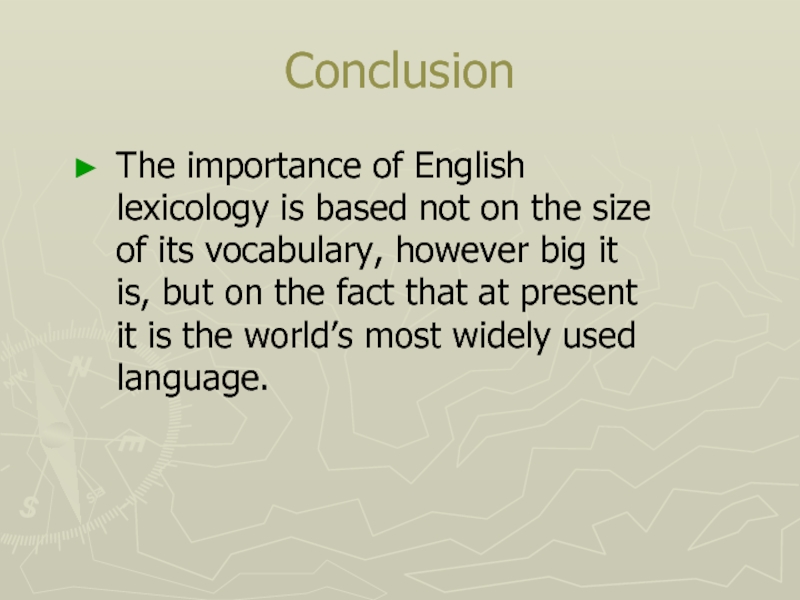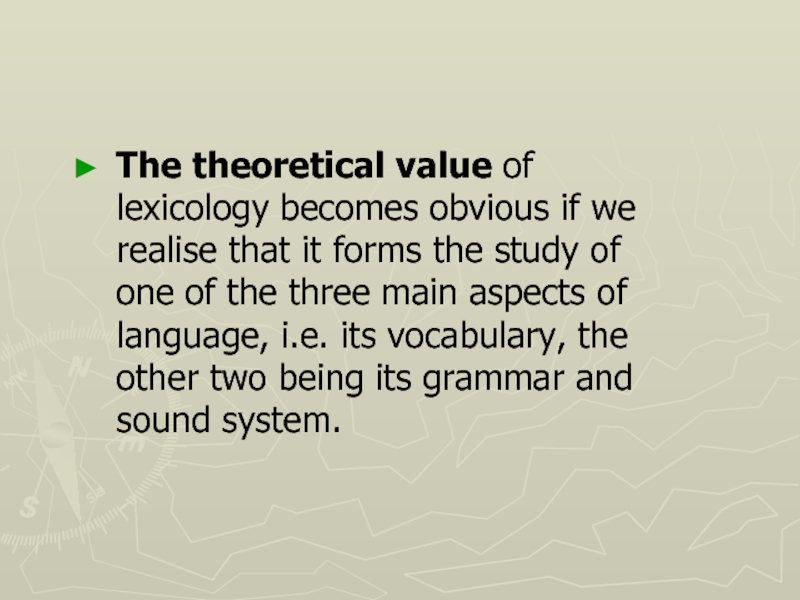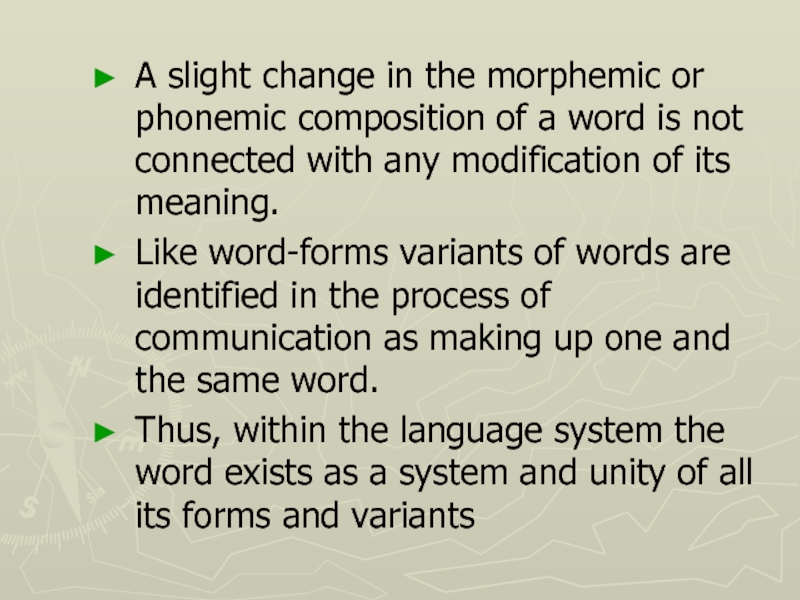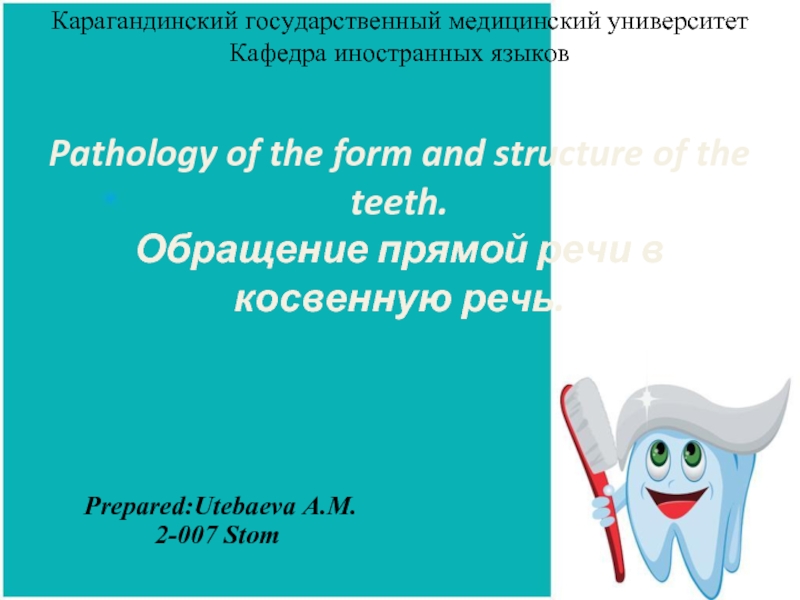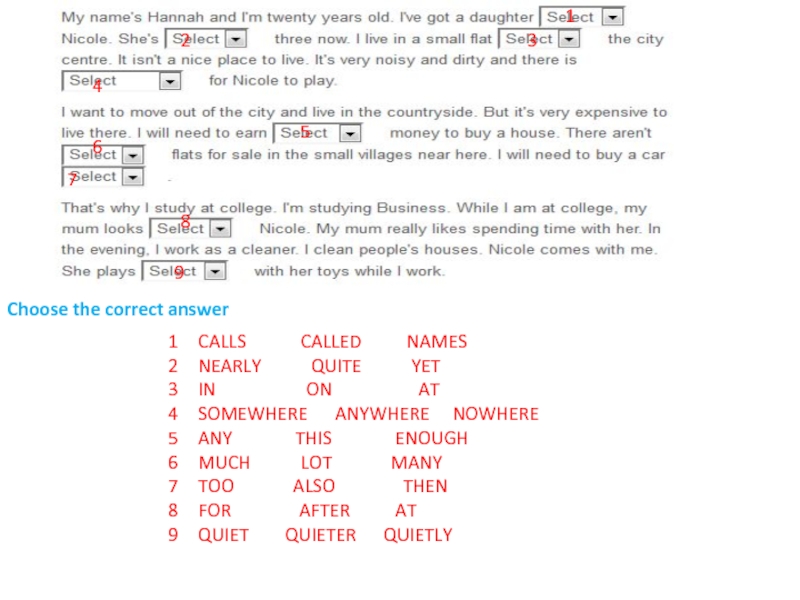- Главная
- Разное
- Дизайн
- Бизнес и предпринимательство
- Аналитика
- Образование
- Развлечения
- Красота и здоровье
- Финансы
- Государство
- Путешествия
- Спорт
- Недвижимость
- Армия
- Графика
- Культурология
- Еда и кулинария
- Лингвистика
- Английский язык
- Астрономия
- Алгебра
- Биология
- География
- Детские презентации
- Информатика
- История
- Литература
- Маркетинг
- Математика
- Медицина
- Менеджмент
- Музыка
- МХК
- Немецкий язык
- ОБЖ
- Обществознание
- Окружающий мир
- Педагогика
- Русский язык
- Технология
- Физика
- Философия
- Химия
- Шаблоны, картинки для презентаций
- Экология
- Экономика
- Юриспруденция
Lexicology as a branch of linguistics презентация
Содержание
- 1. Lexicology as a branch of linguistics
- 2. Lexicology as a Branch of Linguistics
- 3. References Антрушина Г. Б. Лексикология
- 4. Etymology of the word ‘lexicology’ 2 Greek
- 5. I. Lexicology: central terms Lexicology – a
- 6. Lexicology is the part of linguistics dealing
- 7. Basic task : a systematic description
- 8. II. Parts of Lexicology General Lexicology –
- 9. Areas of Lexicology Historical Lexicology. Descriptive Lexicology.
- 10. Functional Approach stands out as describing how
- 11. Modern English Lexicology studies: Semasiology.
- 12. III. Two Approaches to Language Study The
- 13. IV. Lexical Units Morphemes – the smallest
- 14. flower, wall, taxi – words denoting
- 15. V. Varieties of Words The word –
- 16. Paradigm – the system showing a word
- 17. Variants of Words Group One Lexical varieties
- 18. Variants of Words Group Two phonetic
- 19. Conclusion The importance of English lexicology is
- 20. The theoretical value of lexicology becomes
- 21. A slight change in the morphemic or
Слайд 2Lexicology as a Branch of Linguistics
Lexicology: central terms.
Parts and areas
of lexicology.
Two approaches to language study.
Lexical units.
Varieties of words.
Two approaches to language study.
Lexical units.
Varieties of words.
Слайд 3References
Антрушина Г. Б. Лексикология английского языка / Г. Б. Антрушина, О. В. Афанасьева, Н. Н. Морозова.
– М. : Дрофа, 2006. – С. 6 – 10.
Арнольд И. В. Лексикология современного английского языка : учеб. для ин-тов и фак. иностр. яз. – 3-е изд., перераб. и доп. / И. В. Арнольд – М. : Высш. шк., 1986. – C. 9 – 27.
Гвишиани Н. Б. Современный английский язык. Лексикология / Н. Б. Гвишиани. – М. : Академия, 2015. – С. 14 – 24.
Гинзбург Р.З. Лексикология английского языка / Р. З. Гинзбург. М. Высшая школа, 1979. – С. 7 – 11 .
Зыкова И. В. Практический курс английской лексикологии / И. В. Зыкова. М.: Академия, 2006. – С. 6 – 7.
Мизин Т.О. Курс лекцій з порівняльної лексикології англійської та української мов : навч. посіб. для студентів III курсу факультету лінгвістики / Т. О. Мизин.. – Київ, 2005.
Арнольд И. В. Лексикология современного английского языка : учеб. для ин-тов и фак. иностр. яз. – 3-е изд., перераб. и доп. / И. В. Арнольд – М. : Высш. шк., 1986. – C. 9 – 27.
Гвишиани Н. Б. Современный английский язык. Лексикология / Н. Б. Гвишиани. – М. : Академия, 2015. – С. 14 – 24.
Гинзбург Р.З. Лексикология английского языка / Р. З. Гинзбург. М. Высшая школа, 1979. – С. 7 – 11 .
Зыкова И. В. Практический курс английской лексикологии / И. В. Зыкова. М.: Академия, 2006. – С. 6 – 7.
Мизин Т.О. Курс лекцій з порівняльної лексикології англійської та української мов : навч. посіб. для студентів III курсу факультету лінгвістики / Т. О. Мизин.. – Київ, 2005.
Слайд 4Etymology of the word ‘lexicology’
2 Greek morphemes:
lexis - ‘word, phrase’
;
logos - ‘learning, a department of knowledge’.
The literal meaning of the term «lexiсolоgу» is ‘the science of the word’.
logos - ‘learning, a department of knowledge’.
The literal meaning of the term «lexiсolоgу» is ‘the science of the word’.
Слайд 5I. Lexicology: central terms
Lexicology – a branch of linguistics;
Word -
the basic unit of a language;
Vocabulary - the system formed by the total sum of all the words
Vocabulary - the system formed by the total sum of all the words
Слайд 6Lexicology is the part of linguistics dealing with the vocabulary of
the language and the properties of words as the main units of language.
Слайд 7Basic task : a systematic description of the vocabulary of a
given language in respect of its origin, development and current use.
Слайд 8II. Parts of Lexicology
General Lexicology – the study of vocabulary irrespective
of the specific features of any particular language;
Special Lexicology – the Lexicology of a particular language (English, Ukrainian, etc.), i.e. the study and description of its vocabulary and vocabulary units.
Special Lexicology – the Lexicology of a particular language (English, Ukrainian, etc.), i.e. the study and description of its vocabulary and vocabulary units.
Слайд 9Areas of Lexicology
Historical Lexicology.
Descriptive Lexicology.
Comparative Lexicology.
Contrastive Lexicology.
Combinatorial Lexicology.
Applied Lexicology.
Слайд 10Functional Approach
stands out as describing how words are used in discourse
to provide and support meaningful communication.
Слайд 11
Modern English Lexicology studies:
Semasiology.
Word-Structure.
Word-Formation.
Etymology of the English Word-Stock.
Word-groups and Phraseological Units.
Variants
of The English Language.
Lexicography.
Lexicography.
Слайд 12III. Two Approaches to Language Study
The synchronic (descriptive) approach is concerned
with the vocabulary of a language as it exists at a given time or at the present time.
The diachronic (historical) approach refers to Historical Lexicology that deals with the evolution of the vocabulary units of a language over time.
The diachronic (historical) approach refers to Historical Lexicology that deals with the evolution of the vocabulary units of a language over time.
Слайд 13IV. Lexical Units
Morphemes – the smallest indivisible two-facet language unit: stress-full.
Word – the basic unit of language system.
Word-group – the largest two-facet lexical unit comprising more than one word: a high tree.
Phraseological unit – the group of words whose combination is integrated as a unit with a specialised meaning of the whole: a red tape.
Слайд 14 flower, wall, taxi – words denoting objects of the outer
world;
Black frost - ‘frost without snow’,
red tape - ‘bureaucratic methods’,
a skeleton in the cupboard – ‘a fact of which a family is ashamed and which it tries to hide’ - phraseological units
Black frost - ‘frost without snow’,
red tape - ‘bureaucratic methods’,
a skeleton in the cupboard – ‘a fact of which a family is ashamed and which it tries to hide’ - phraseological units
Слайд 15V. Varieties of Words
The word –
a two-facet unit possessing both form
and content or soundform and meaning.
Neither can exist without the other.
Neither can exist without the other.
Слайд 16Paradigm – the system showing a word in all its word-forms.
Word-forms
– grammatical forms of words:
e.g. walk, walks, walked, walking;
e.g. singer, singer’s, singers, singers’.
His brother is a well-known singer.
I wonder who has taken my umbrella.
e.g. walk, walks, walked, walking;
e.g. singer, singer’s, singers, singers’.
His brother is a well-known singer.
I wonder who has taken my umbrella.
Слайд 17Variants of Words
Group One
Lexical varieties - lexico-semantic variant – the word
in one of its meanings.
e.g. green
LSV1 - colour of grass;
LSV2 - not ready to be eaten;
LSV3 - not experienced;
LSV4 - made of green leaves of vegetables;
etc.
e.g. green
LSV1 - colour of grass;
LSV2 - not ready to be eaten;
LSV3 - not experienced;
LSV4 - made of green leaves of vegetables;
etc.
Слайд 18Variants of Words
Group Two
phonetic variants:
often [‘O:fn] and [‘O:ftn];
again [ə’gein] and
[ə’gen].
morphological variants:
learned [-d] and learnt [-t];
geologic – geological, etc.
morphological variants:
learned [-d] and learnt [-t];
geologic – geological, etc.
Слайд 19Conclusion
The importance of English lexicology is based not on the size
of its vocabulary, however big it is, but on the fact that at present it is the world’s most widely used language.
Слайд 20
The theoretical value of lexicology becomes obvious if we realise that
it forms the study of one of the three main aspects of language, i.e. its vocabulary, the other two being its grammar and sound system.
Слайд 21A slight change in the morphemic or phonemic composition of a
word is not connected with any modification of its meaning.
Like word-forms variants of words are identified in the process of communication as making up one and the same word.
Thus, within the language system the word exists as a system and unity of all its forms and variants
Like word-forms variants of words are identified in the process of communication as making up one and the same word.
Thus, within the language system the word exists as a system and unity of all its forms and variants
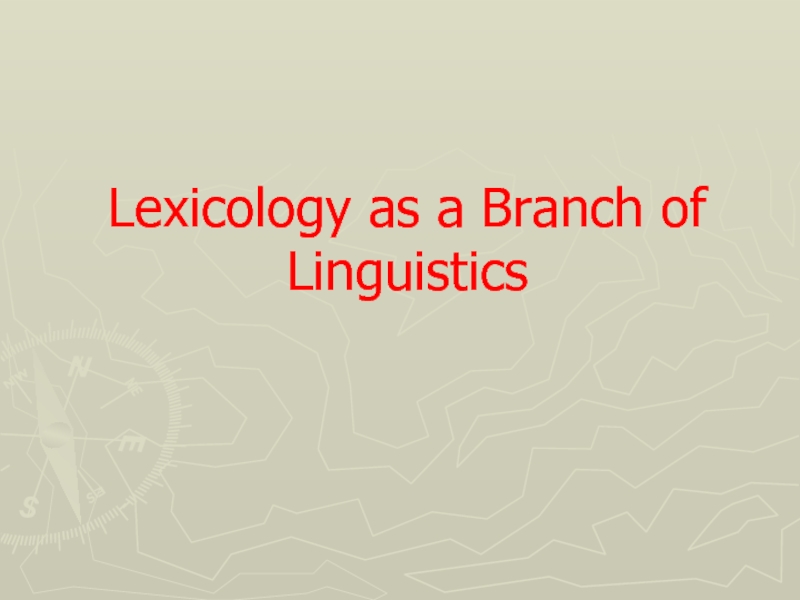
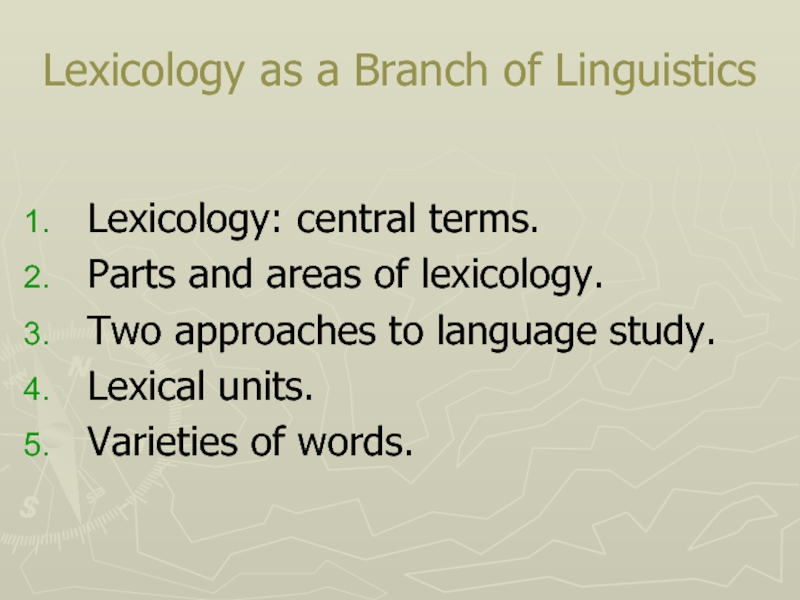
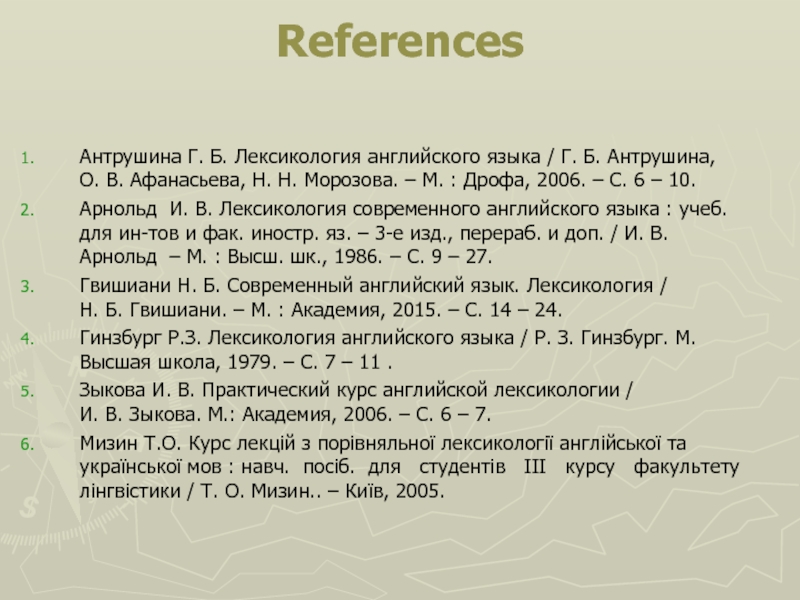
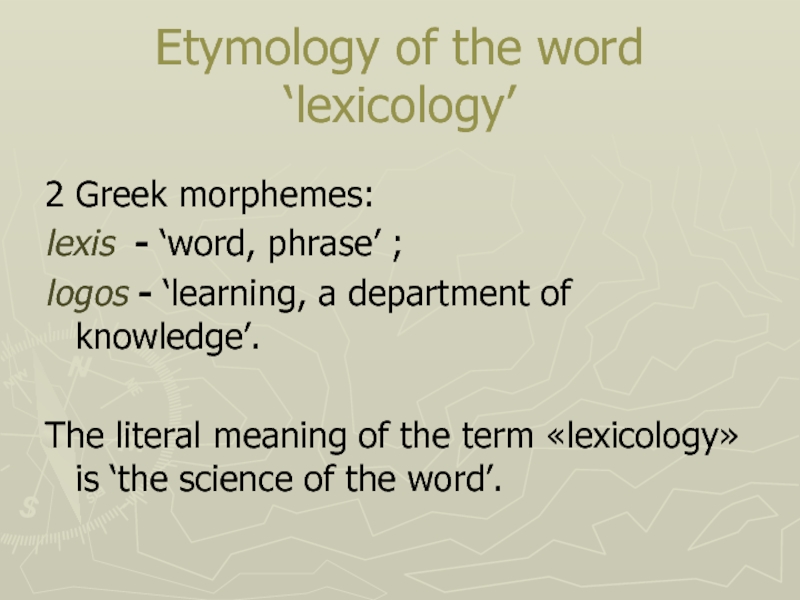
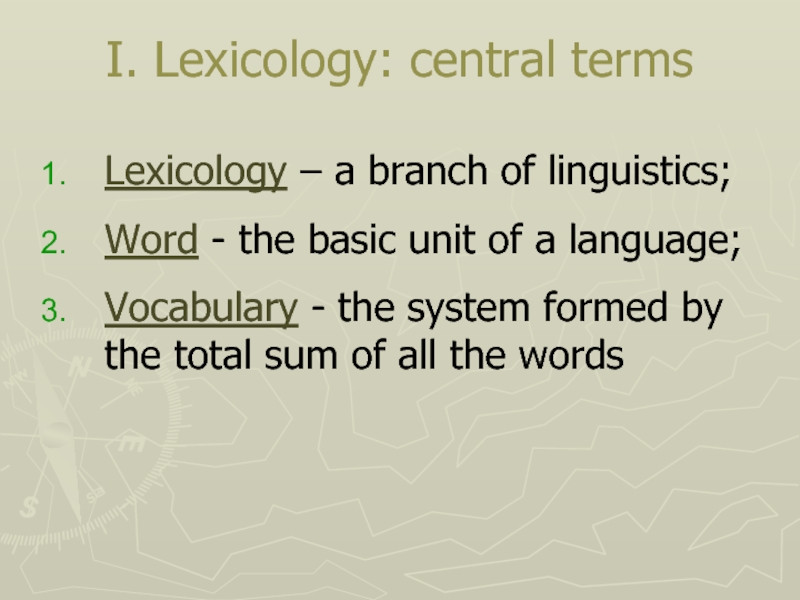
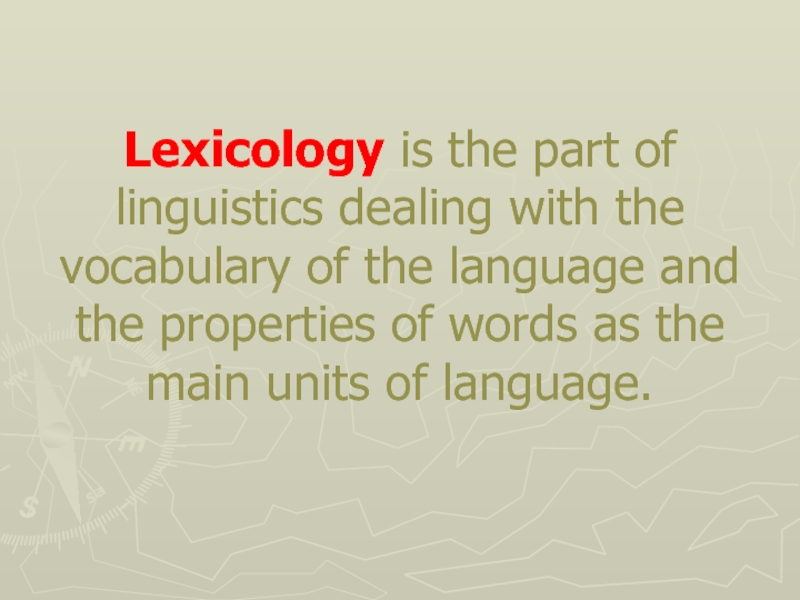
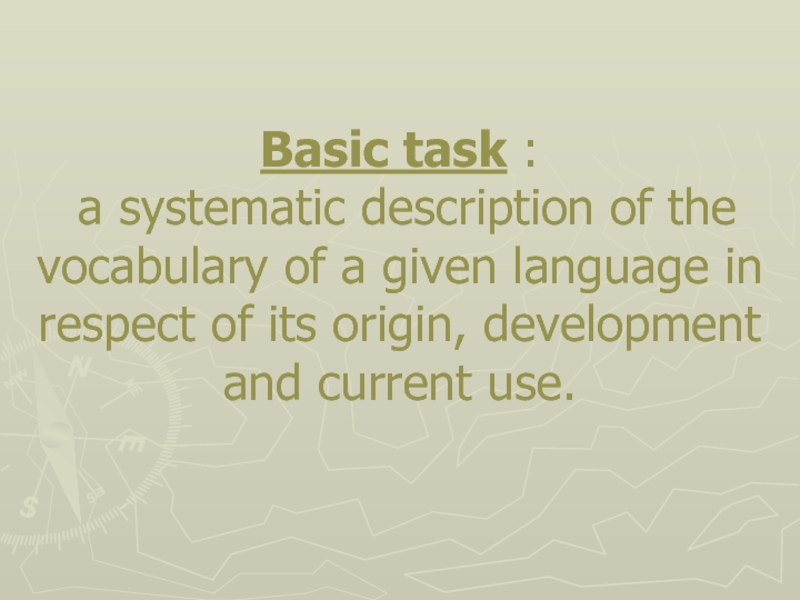
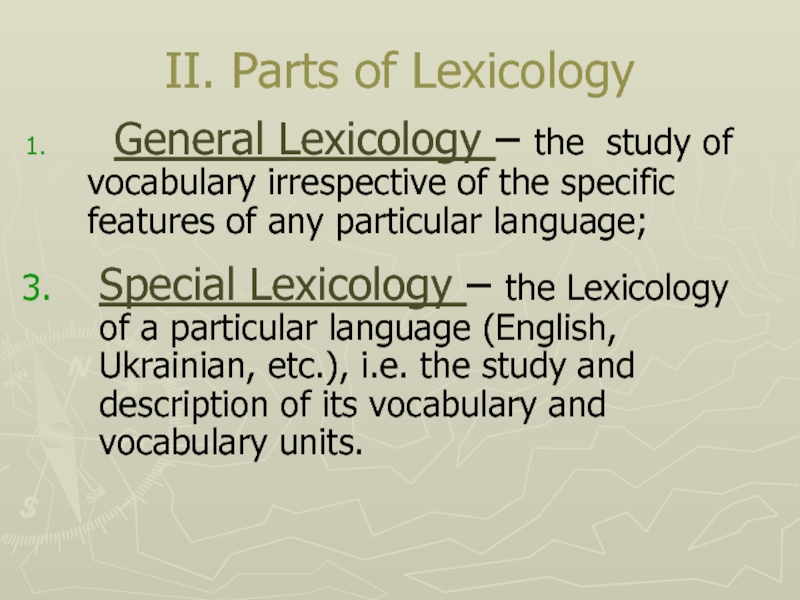
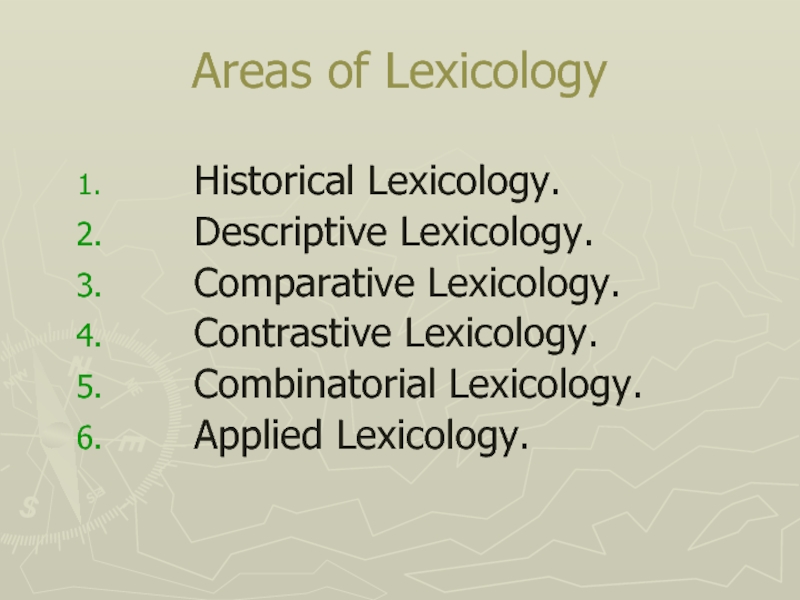

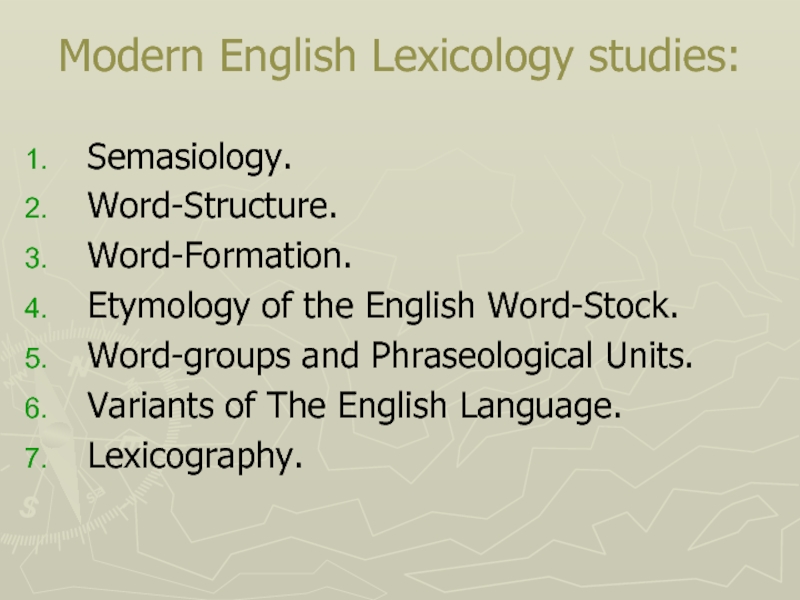
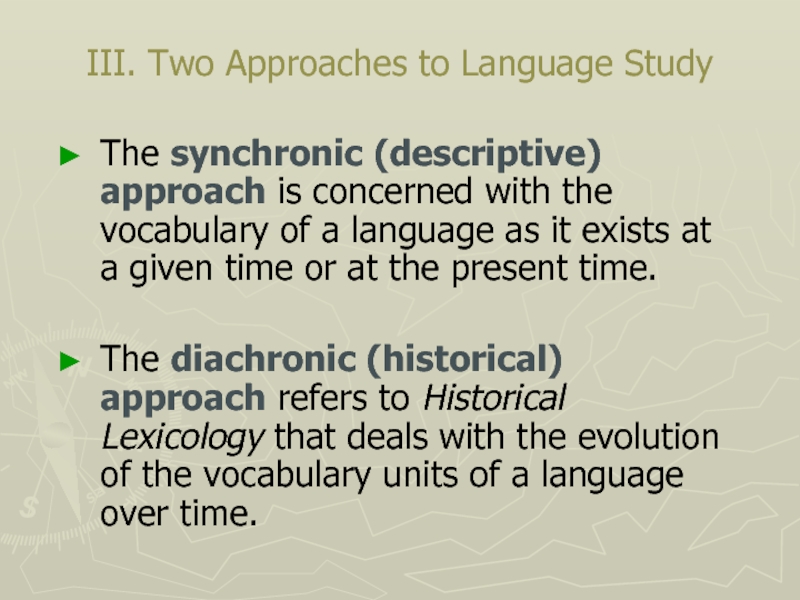
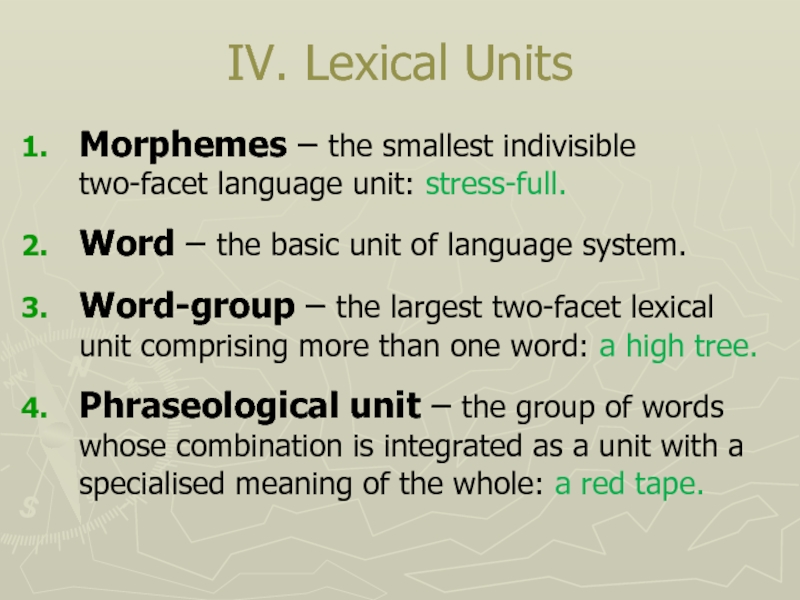
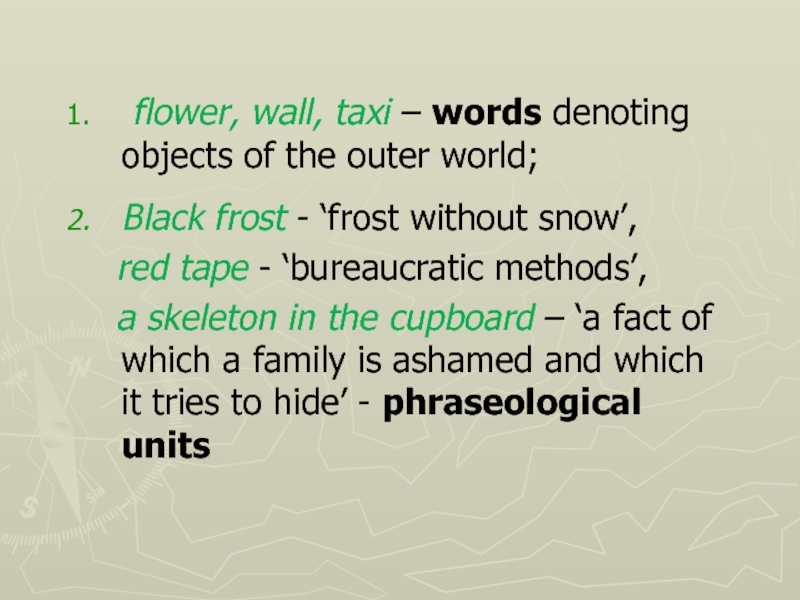
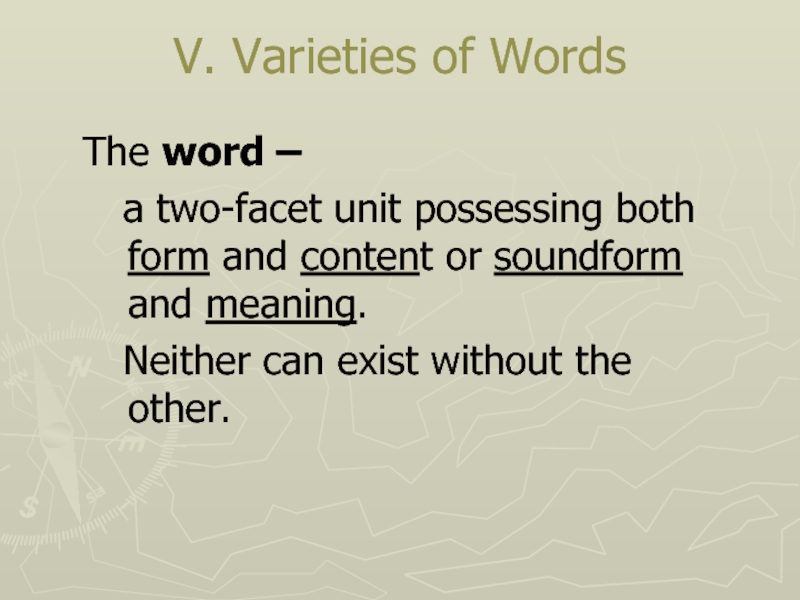
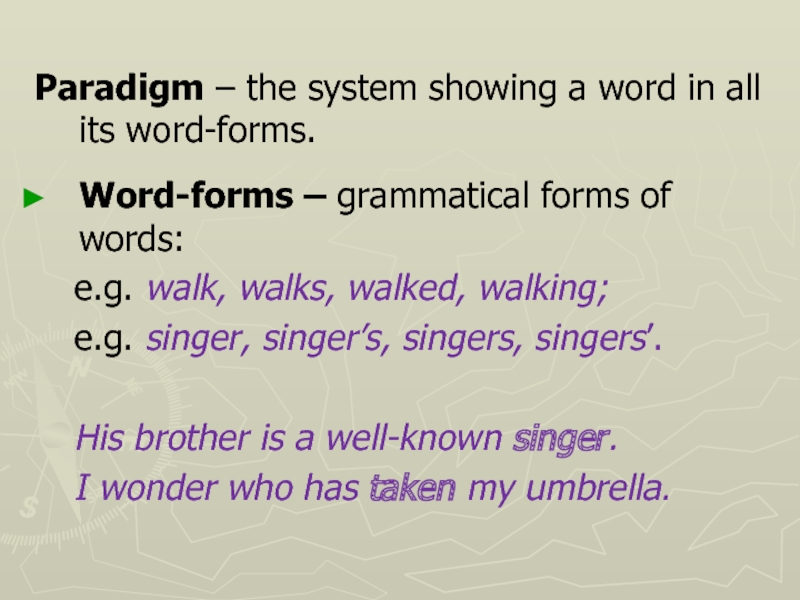
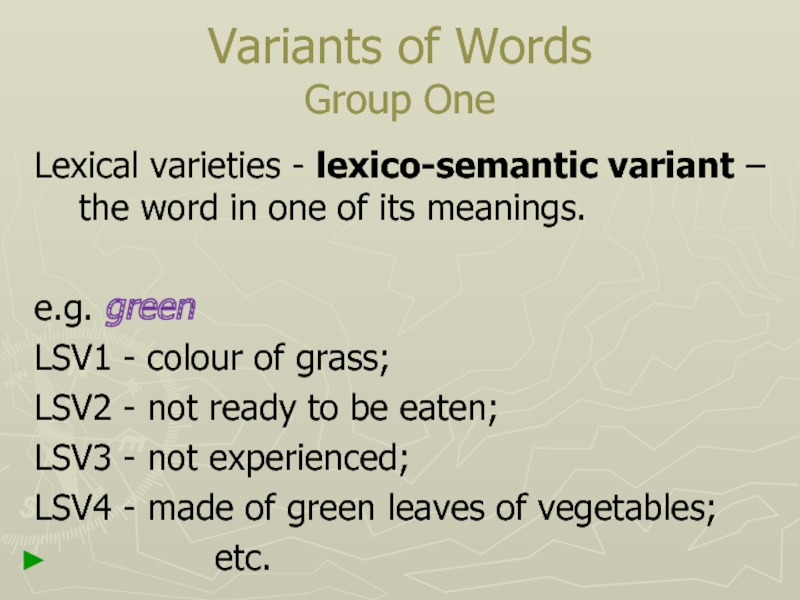
![Variants of Words Group Twophonetic variants: often [‘O:fn] and [‘O:ftn]; again [ə’gein] and [ə’gen]. morphological variants:](/img/tmb/4/357068/c556ad6de0715840d0638322f990c5d4-800x.jpg)
